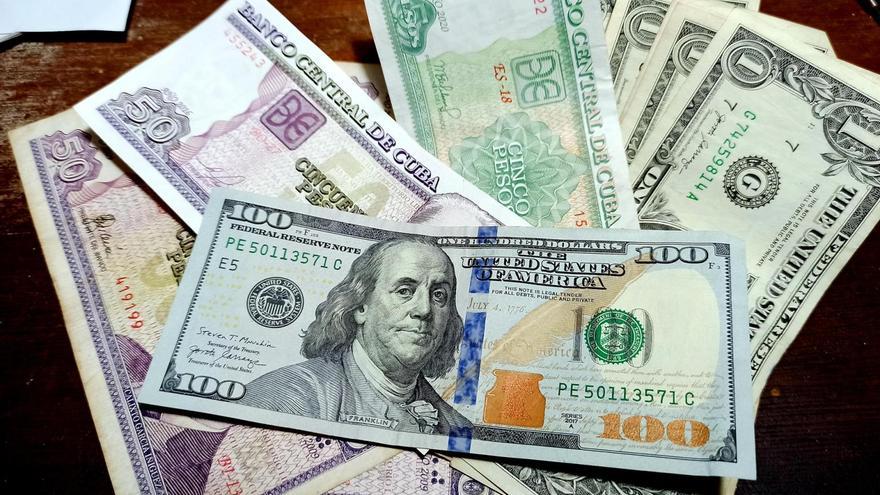
![]() 14ymedio, Natalia López Moya, Havana, September 3, 2023 — “No, I’m not buying foreign currency at the moment,” an informal money changer in Central Havana responds bluntly. In two weeks the dollar has fallen from the 250 pesos it cost in mid-August to 215 pesos this Sunday, according to the reference rate published by the digital site El Toque. The euro has also experienced a similar decline and went from being quoted above 255 pesos to currently sold in the informal market at 225 pesos. However, the speed of the collapse causes a lot of distrust. Some even speak of an artificial drop motivated by the emergence of false money changers on digital sites that promise dollars and euros at increasingly lower prices.
14ymedio, Natalia López Moya, Havana, September 3, 2023 — “No, I’m not buying foreign currency at the moment,” an informal money changer in Central Havana responds bluntly. In two weeks the dollar has fallen from the 250 pesos it cost in mid-August to 215 pesos this Sunday, according to the reference rate published by the digital site El Toque. The euro has also experienced a similar decline and went from being quoted above 255 pesos to currently sold in the informal market at 225 pesos. However, the speed of the collapse causes a lot of distrust. Some even speak of an artificial drop motivated by the emergence of false money changers on digital sites that promise dollars and euros at increasingly lower prices.
“When you call, they tell you that they have already sold them, but it sounds like a lie,” says Nataniel, a 26-year-old who buys dollars to embark on the migratory route through Nicaragua. “All the ads I have found with dollars below 230 pesos have come to nothing, or the phone turns off or they say that they don’t have any left.”
A similar opinion spreads among foreign exchange buyers. María Antonia has a small cell phone repair business in the Havana neighborhood of San Leopoldo. Thanks to her Spanish nationality, she frequently travels to Madrid to buy spare parts and devices to resell on the Island. Her neighbors know that she is always interested in buying euros for her trips.
But for several days, María Antonia has been “paralyzed,” according to 14ymedio. “If it is true that the currency is falling, it is better to wait for it to fall further. If everything is momentary and forced by the Government, then it is also better to wait because despair lends itself to scams, thefts and risks. So I’m not buying,” she explains.
Other entrepreneurs and private business owners also add to that distrust. “This container that we are going to receive with chicken and oil in the first days of September is going to be the last because this bancarización* is affecting us,” warns Julián (his name is changed to avoid reprisals), an accounting worker of a small private company.
“On the one hand, a cheaper dollar suits us because that is the currency we have to buy to be able to import merchandise, but our customers pay us mainly in Cuban pesos. We bought the currency a few weeks ago at a low price but now we lose when we have to sell with a lower exchange rate,” he says.
“You have to be patient and not rush. It’s not final, and people no longer have confidence in the Cuban peso,” he says. For the moment, the solution to avoid having major losses in your business has been to “try to sell as much as you can directly in euros or dollars.”
Many point to bancarización and its focus on reducing cash transactions as the main reason for changes in the informal currency market. With the new regulations, the ruling party has imposed restrictions on small and medium-sized businesses for the extraction of cash from bank branches. “We have had to cancel several contracts that we already had,” Julián says.
“Two of those contracts were with state entities and right now our demand for dollars has also fallen because we have at least two large purchases abroad that we are no longer going to make,” he adds. The entrepreneur believes that things will even out and “the dollar will rise again.”
Translated by Regina Anavy
*Translator’s note: “Bancarización” is term used in Cuba and other Latin American countries that refers to government efforts to reduce the role of cash through a greater reliance on banks’ digital payment options. The term does not seem to have a counterpart in English so the Spanish term is used throughout this translation.
____________
COLLABORATE WITH OUR WORK: The 14ymedio team is committed to practicing serious journalism that reflects Cuba’s reality in all its depth. Thank you for joining us on this long journey. We invite you to continue supporting us by becoming a member of 14ymedio now. Together we can continue transforming journalism in Cuba.
